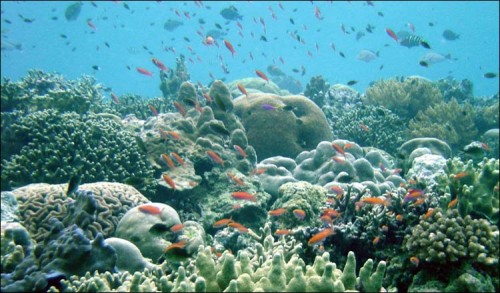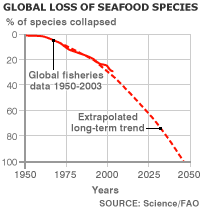We have covered several times on this site the unsustainable way in which fishing is conducted. The real danger is that a vast portion of this planet relies on the oceans for their major source of food…a study from a few years ago illustrates just how dire the situation is.
There will be virtually nothing left to fish from the seas by the middle of the century if current trends continue, according to a major scientific study.
Stocks have collapsed in nearly one-third of sea fisheries, and the rate of decline is accelerating.
Writing in the journal Science, the international team of researchers says fishery decline is closely tied to a broader loss of marine biodiversity. (via)
This is bad…really bad. If the nations of the world don’t act now, it is very likely that we will see a global industry collapse, wide spread starvation, wars over fishing stock, piracy, and if we are really unlikely the collapse of the ocean eco-system. How bad is this? here is the summary from the report.
Ecological extinction caused by overfishing precedes all other pervasive human disturbance to coastal ecosystems, including pollution, degradation of water quality, and anthropogenic climate change. Historical abundances of large consumer species were fantastically large in comparison with recent observations. Paleoecological, archaeological, and historical data show that time lags of decades to centuries occurred between the onset of overfishing and consequent changes in ecological communities, because unfished species of similar trophic level assumed the ecological roles of overfished species until they too were overfished or died of epidemic diseases related to overcrowding. Retrospective data not only help to clarify underlying causes and rates of ecological change, but they also demonstrate achievable goals for restoration and management of coastal ecosystems that could not even be contemplated based on the limited perspective of recent observations alone. (via)
Basically we have fished as much as we can…and it will take a long time for the fish to come back IF we stop fishing. The problem is we are not going to stop, too many people get their living, and their sustenance from the ocean. This problem really makes me sad, because so many people are going to die once these fish are gone, so much of the biosphere are going to be ruined, and there is a possibility that if the entire ocean ecology falls apart that we could in fact ruin our entire planet.
This one particular problem is going to be a test of our resolve to save our own lives more than any other, it is also going to happen faster than any other looming problem. So what can you do? Simple.
STOP EATING FISH!
If you can’t stop eating fish, eat less fish. Support limits on fishing, support the protection of marine areas, support no-fish zones.


